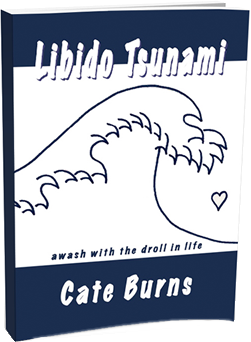The Last Playboy

On the last Friday of each month, when Ernie, my mother’s third and final husband, had finished his Playboy magazine, Mom took it. With her flashing blue eyes and platinum wig, she effused dramatic flair. Over time, she devised the most interesting and amusing way to recycle the monthly subscription.
Their driveway swooped up a long hill on the west side of the house and ended in a detached garage in the back where Ernie kept the trash cans. A retired salesman with permed white hair that framed his round face like a Caucasian Afro, he frequently bragged that he had the cleanest garbage bins in all of Seattle. Besides disinfecting and scrubbing them every two weeks, he carefully bundled each bag of refuse and sealed it with wide strapping tape. No soggy coffee filter or banana peel ever escaped.
In the 1980s, before waste bins sported small wheels, homeowners dragged or carried their garbage containers from the house to the curb. When my parents reached their sixties, the city of Seattle offered a thoughtful and necessary service: sanitary workers trotted up the driveway, hoisted the large metal, and later plastic, containers onto their wide shoulders, carried them down to the waiting truck and then returned them to the garage. I felt grateful that my aging parents no longer struggled with the unwieldy, heavy objects.
My parents’ trash collector, blond, green eyed, in his early twenties, looked rugged and athletic. He seemed to regard the uphill driveway as a workout opportunity and eagerly dashed to do his chores. During those years, I lived in another state and visited Mom and Ernie for ten days to two weeks at a time. I learned that rubbish day fell on Fridays.
The sunny west side of the house, along the driveway, sported picture windows from the living room to the dining area and into the kitchen. From the outdoors, looking in, my mother must’ve flashed as brightly as a forest bird in her flowing colorful caftans as she darted from window to window watching the muscular man carry her discards.
With her nose for spectacle, Mom realized the many windows, driveway and energetic city employee provided a perfect stage set. She could use this weekly occurrence to entertain her usual audiences of family and friends. All she needed was a hook: she found this in Ernie’s regularly discarded Playboy magazines.
The last Friday of each month, Mom took Ernie’s gently used Playboy, wrapped it in clear plastic and placed the magazine atop Ernie’s tidy packages of trash. She posted a small note on top of the waste bin’s lid telling the young man to “Look inside.”
Then the entertainment began. On a Friday, I’d hear Mom yell to the various visitors she usually had around, “The garbage man’s coming. Get over here, fast.” I’d hear the clump, clump of her rushing feet. Mine soon joined hers as we ran to keep up with the quick young man. “There he is. Will he find the magazine?” Laughing, I joined with her and the other guests in the silly revelry.
In all those years, it never occurred to me that the garbage collector must’ve seen us gaping at him as we pranced to each window. We acted as though the glass provided a one-way barrier that prevented him from viewing us. Apparently, going along with the charade, he appeared not to notice us. Every last Friday of the month, he opened the bin and removed the neatly wrapped magazine. This caused Mom to whoop, “He got it. He found it.” He tucked it inside his shirt, hefted the large can and hurried down the driveway as if the bulky bin were filled with feathers.
We followed him to the last window in the living room nearest the street where Mom enacted her climax of the scene. When he’d reached his truck, dumped the trash, returned the bin and climbed back in his vehicle, Mom gloated. “See? The truck’s not moving, not going to the next house. He must be reading the magazine, checking out the centerfold, I’ll bet.” While pure conjecture on her part, for we couldn’t see inside the cab, Mom’s joy reached its apex. She cackled with glee. A rebel and rascal at heart, she seemed to feel she’d seduced him into taking an illegal break from his boring municipal job to enjoy a scandalous Playboy.
Whenever I visited for the next twenty years, her harmless lark remained a joyous ritual. The young hunk turned into a fit and muscular man in his forties, still jogging up and down the driveway with heavy loads and collecting his monthly erotica. In all those years, we never made eye contact. Mom acted the part of a femme fatale, a risqué woman leading a city worker into sin once a month. For many years, she regaled family and friends with the Playboy magazine/trash collector story with great relish.
In the spring of 1998, at age eighty-six, sadly, Ernie passed away. Our family mourned, for he and Mom had enjoyed a good twenty-six years together. Mom continued Ernie’s clean trash habit. The City of Seattle began an innovative recycling program as part of its sanitation department. Through all these changes, Mom never got around to stopping the Playboy subscription. Every final Friday of the month, she put a note on the lid to “Look inside,” and carefully placed the magazine there.
Without Ernie, Mom lasted less than a year. In January, 1999, after eighty winters, her sudden death from a blood clot in her brain shocked the family and sent us into a tailspin. Several weeks later, my oldest sister and I stood in the kitchen, making an inventory. Eva had been assigned executor of Mom’s will and I felt relieved because this meant I didn’t have to do it.
In her late fifties, Eva’s soft brown hair, unevenly streaked with grey, fell around her shoulders. During our coffee break, she twirled a strand near her ear. “Oh, by the way, I found one of Ernie’s Playboys lying around. Do you want it?”
With a watery smile, I shook my head. “No, thanks. Hey, why don’t we give it to the recycle guy, the way Mom always did?
“Great idea! What day is today? Oh, it’s Friday, let’s do it now. He hasn’t come yet.” We wrapped the Playboy in plastic, just as Mom had done. We taped a note to it, gently explaining that Mom had passed away and we felt sure she wanted to give him this one last magazine. We carefully placed it on the other packages of trash, attached the lid and stuck a note on top to “Look inside.”
An hour later, the blond sanitation worker, his hair now sparkling with silver strands and still energetic, scampered up the hill. As usual, we walked from window to window, but without Mom’s cheerleading, our feet dragged. Through a large kitchen window, we peered at him as he opened the trash lid, removed the magazine, and paused to read our message. He hesitated, than ponderously raised the weighty bin to his shoulder. After two decades, I finally perceived how heavy his burden must be. He slowly turned to head downhill.
When he came to the kitchen window where we stood, for the first time, he stopped and looked at us, his eyes glistening. We sobbed as we stared back, and raised our hands in a solemn greeting, not waving. We held our palms upright, open to him, near our heads. He did the same. For over twenty years, we’d never acknowledged each other. Now, in our mutual grief, we broke the rules of Mom’s game. How strange that a lighthearted gesture with a frivolous magazine had, in the end, touched our souls.
After a few moments, he trudged down to his truck. We didn’t accompany him from window to window because we were crying too hard, clutching each other’s hands and arms at first. Then I collapsed against my sister in a hard hug and she gripped me with a strong grasp. Our moments with the trash collector, acknowledging that the game had ended, meant that Mom was really gone.
We didn’t look, as Mom would have, to see if he paused before driving to the next house. If he spent a few minutes alone in his cab, I doubted that he turned to the centerfold. But maybe he did. If so, Mom would’ve been pleased.

Cate Burns is the author of Libido Tsunami: Awash with the Droll in Life, in which she unearths the ludicrous in the emotional live traps surrounding us — in families, friends and disastrous romances. Get it on Amazon today.
